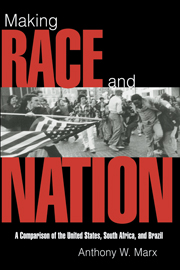Book contents
- Frontmatter
- Contents
- Preface and Acknowledgments
- 1 Introduction
- Part One Historical and Cultural Legacies
- Part Two Racial Domination and the Nation-State
- Part Three Race Making from Below
- 8 “We Are a Rock”
- 9 Burying Jim Crow
- 10 Breaching Brazil's Pact of Silence
- Comparative Overview
- 11 Conclusion
- Notes
- Bibliography
- Index
10 - Breaching Brazil's Pact of Silence
Published online by Cambridge University Press: 05 June 2012
- Frontmatter
- Contents
- Preface and Acknowledgments
- 1 Introduction
- Part One Historical and Cultural Legacies
- Part Two Racial Domination and the Nation-State
- Part Three Race Making from Below
- 8 “We Are a Rock”
- 9 Burying Jim Crow
- 10 Breaching Brazil's Pact of Silence
- Comparative Overview
- 11 Conclusion
- Notes
- Bibliography
- Index
Summary
Race making from above and below also has been an interactive process in Brazil. If legal racial domination elsewhere reinforced racial identity and provoked protest among blacks, then did the relative absence of such official domination in Brazil reduce the salience of racial identification and restrain mobilization there? Certainly a minimum of identity formation is an essential basis for mobilization, prior to the influence of resources or opportunities. Without consolidation of an identity, mobilization is less likely. Indeed, Brazil's racial order has not been challenged by assertions of black solidarity and protest comparable to the anti-apartheid or civil rights movements. Despite significant discrimination, racial democracy has engendered more muted protest, suggesting that state actions are more consequential for race relations than informal social practices. This general argument can be assessed against Brazilian experience, as a negative test of the patterns found in South Africa and the United States.
That there has been rising black protest in modern Brazil demonstrates that racial identity and mobilization are not simply reactions to state policy. Instead, Afro-Brazilian solidarity has built upon particularly strong cultural and religious traditions and been reinforced by evident discrimination and inequality. Identity has been asserted and protests pressing the state to act have been made. But as elsewhere, state policy has often shaped particular outcomes. For instance, state receptivity has provoked more moderate forms of mobilization, and greater repression and hardening of state policies have produced greater militancy.
- Type
- Chapter
- Information
- Making Race and NationA Comparison of South Africa, the United States, and Brazil, pp. 250 - 263Publisher: Cambridge University PressPrint publication year: 1997

